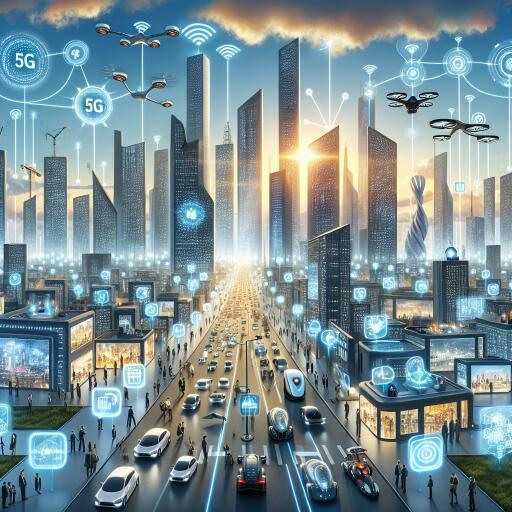The Role of 5G in Enabling the Next Generation of Smart Cities
The dawn of the fifth-generation wireless network, known as 5G, heralds a transformative era for urban environments around the globe. As cities burgeon, becoming more intricate and populated, the push for smarter, sustainable solutions grows ever more critical. The integration of 5G within urban landscapes proposes an evolution in municipal operations, enhancing the lives of residents through innovative technology. This piece delves into how 5G is setting the stage for the next wave of smart cities, discussing the advantages, the hurdles of network deployment, promising applications, and the pivotal factors steering their fruition.
Transformative Benefits of 5G in Urban Ecosystems
The leap to 5G connectivity is poised to significantly refurbish public safety, environment monitoring, healthcare, and traffic management. Unlike its predecessors, 5G networks promise expedited, steadfast connectivity across a broad spectrum of sensors and devices, facilitating real-time data analysis for more judicious resource allocation and emergency response. A prime instance of this technology in action involves the real-time monitoring and adjustment of traffic signals to alleviate vehicular congestion, showcasing 5G’s capability to streamline urban mobility with remarkable efficiency.
Another cornerstone advantage lies in 5G’s minuscule latency, which drastically diminishes the response time between devices to a mere few milliseconds. This attribute is particularly beneficial for autonomous vehicles and other applications necessitating real-time data for safe and effective operation.
Furthermore, 5G networks can accommodate a substantially higher volume of connected devices over a dense area, vital for the intricate web of sensors and devices that a smart city encompasses. This enables comprehensive monitoring and management, from air quality assessments to waste management, thereby fostering a healthier, more sustainable urban environment.
Challenges in the 5G Horizon
Despite the enticing prospects of 5G in revolutionizing urban spaces, deploying such networks is not without its challenges. The most formidable of these is the substantial cost associated with erecting the requisite infrastructure, which includes not just small cells but also extensive fiber-optic cable networks and additional hardware. This financial barrier may deter many municipalities, especially those grappling with constrained budgets.
Moreover, the inclusive accessibility of 5G services remains a pressing concern. To ensure that the advancements propelled by 5G touch every community equitably, concerted efforts to bridge the digital divide are imperative. This means extending high-speed, dependable connectivity to all sectors of the populace, irrespective of their economic standing.
5G-Powered Smart City Applications
The ambit of smart city initiatives that 5G could enable is broad and diverse. For instance, enhanced energy management through 5G-driven sensors and IoT devices could usher in novel ways to optimize energy consumption, leveraging artificial intelligence to distribute power more efficiently and sustainably.
In the realm of transportation, 5G is set to revolutionize transit by enabling autonomous vehicles to communicate seamlessly with traffic systems and each other, thus mitigating congestion and reducing environmental impact. Similarly, in healthcare, the high-speed, reliable data transfer offered by 5G could facilitate remote monitoring and robotic surgeries, particularly benefiting remote locales.
A promising frontier for 5G lies in the realm of augmented and virtual reality experiences. Thanks to its low latency and high data throughput, 5G is poised to deliver immersive, high-quality content to mobile devices and wearables, creating exciting possibilities for entertainment, education, and vocational training.
Conclusion: Navigating the 5G and Smart City Odyssey
The journey towards 5G-fueled smart cities is fraught with both promise and challenges. While the prospects for urban transformation are boundless, careful strategizing and investment are crucial to overcoming the hurdles of equitable access and data security. As cities worldwide edge closer to this new technological dawn, the collective anticipation for a smarter, more connected urban future becomes increasingly palpable, marking the beginning of a new chapter in the story of human habitation.









